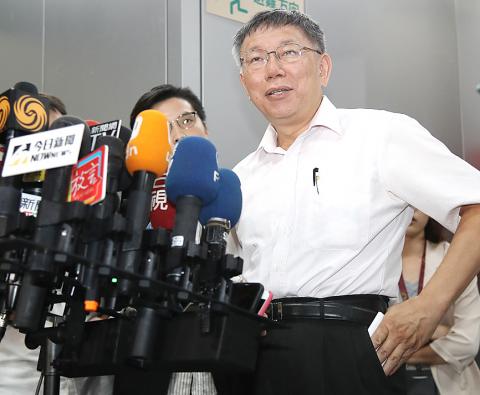Taipei Mayor Ko Wen-je (柯文哲) yesterday said he would not register as an independent candidate in next year’s presidential election, and respects Hon Hai Precision Industry Co founder Terry Gou’s (郭台銘) decision not to run, even though the announcement came as a surprise.
Ko has considered running for a long time, but has always said he would make a decision by yesterday, the Central Election Commission’s deadline to register as an independent candidate.
For the past couple of months, Ko has repeatedly expressed his support for Gou and offered to help him collect petition signatures if he decides to run.

Photo: CNA
“I had originally decided to assist [Gou’s] election campaign, but his decision came too suddenly — I am just as shocked as all of you are,” Ko said.
Gou only informed him about his decision shortly before he announced it to the public, Ko said.
He said he respects Gou’s decision and would not view it as an “assault,” but if Gou had made the decision a month ago, there would have been plenty of time for him to prepare his own bid.
Asked whether Gou had approached him about being his running mate, Ko said that he had long ago rejected the proposal, as he would rather run for president himself and knew it would have been difficult to handle his mayoral duties while running for vice president.
Ko also read a prepared three-page statement responding to Gou’s decision in which he said: “I have never said I would run in next year’s presidential election, but the pan-blue and pan-green camps kept seeing me as an imaginary enemy and putting me in their primary opinion polls.”
“Running for president right after being elected mayor is not a situation that should occur in a normal country, as it would affect municipal administration,” he said, adding that if he could change the political culture in Taipei, it could affect the rest of the nation.
Ko said he was anxious when the presidential candidates of the two major parties were decided, as Taiwan is to get bogged down in a battle between pro-unification and pro-independence ideologies, but what the nation really needs is to improve the efficiency, practicality and performance of its governance.
The election is now to be between the pan-blue and pan-green camps, meaning that it is important for the Taiwan People’s Party (TPP) to win some legislator-at-large seats, so it can become the key minority in the Legislative Yuan, he said.
If the two major parties do not win more than half of the seats in the legislature next year, then TPP legislators could cooperate with both parties to reduce the opposition’s unreasonable opposition and monitor the ruling party’s unscrupulous behavior, Ko said, adding that the TPP would nominate at least 34 candidates for legislator-at-large seats.

Taiwan is to commence mass production of the Tien Kung (天弓, “Sky Bow”) III, IV and V missiles by the second quarter of this year if the legislature approves the government’s NT$1.25 trillion (US$39.78 billion) special defense budget, an official said yesterday. Commenting on condition of anonymity, a defense official with knowledge of the matter said that the advanced systems are expected to provide crucial capabilities against ballistic and cruise missiles for the proposed “T-Dome,” an advanced, multi-layered air defense network. The Tien Kung III is an air defense missile with a maximum interception altitude of 35km. The Tien Kung IV and V

The disruption of 941 flights in and out of Taiwan due to China’s large-scale military exercises was no accident, but rather the result of a “quasi-blockade” used to simulate creating the air and sea routes needed for an amphibious landing, a military expert said. The disruptions occurred on Tuesday and lasted about 10 hours as China conducted live-fire drills in the Taiwan Strait. The Civil Aviation Administration (CAA) said the exercises affected 857 international flights and 84 domestic flights, affecting more than 100,000 travelers. Su Tzu-yun (蘇紫雲), a research fellow at the government-sponsored Institute for National Defense and Security Research, said the air

Taiwan lacks effective and cost-efficient armaments to intercept rockets, making the planned “T-Dome” interception system necessary, two experts said on Tuesday. The concerns were raised after China’s military fired two waves of rockets during live-fire drills around Taiwan on Tuesday, part of two-day exercises code-named “Justice Mission 2025.” The first wave involved 17 rockets launched at 9am from Pingtan in China’s Fujian Province, according to Lieutenant General Hsieh Jih-sheng (謝日升) of the Office of the Deputy Chief of the General Staff for Intelligence at the Ministry of National Defense. Those rockets landed 70 nautical miles (129.6km) northeast of Keelung without flying over Taiwan,

A strong continental cold air mass is to bring pollutants to Taiwan from tomorrow, the Ministry of Environment said today, as it issued an “orange” air quality alert for most of the country. All of Taiwan except for Hualien and Taitung counties is to be under an “orange” air quality alert tomorrow, indicating air quality that is unhealthy for sensitive groups. In China, areas from Shandong to Shanghai have been enveloped in haze since Saturday, the ministry said in a news release. Yesterday, hourly concentrations of PM2.5 in these areas ranged from 65 to 160 micrograms per cubic meter (mg/m³), and pollutants were